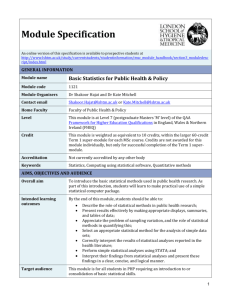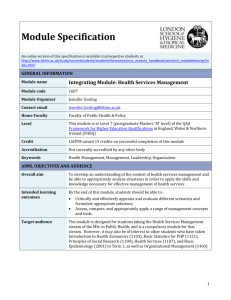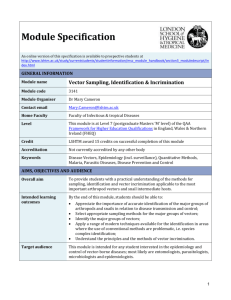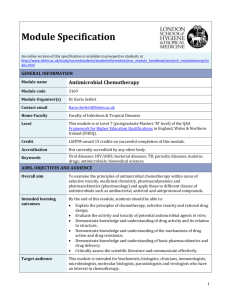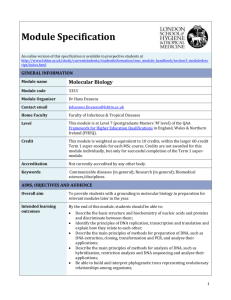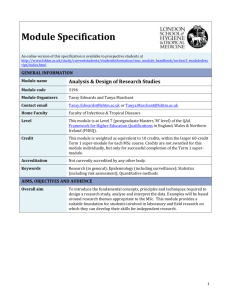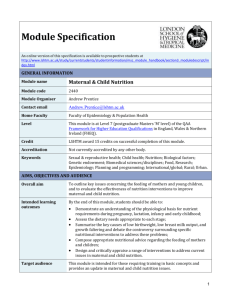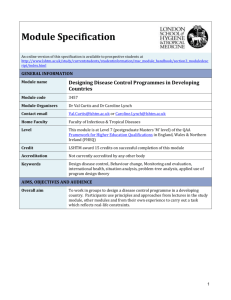3191 Vaccine_immunology Module Specification
advertisement
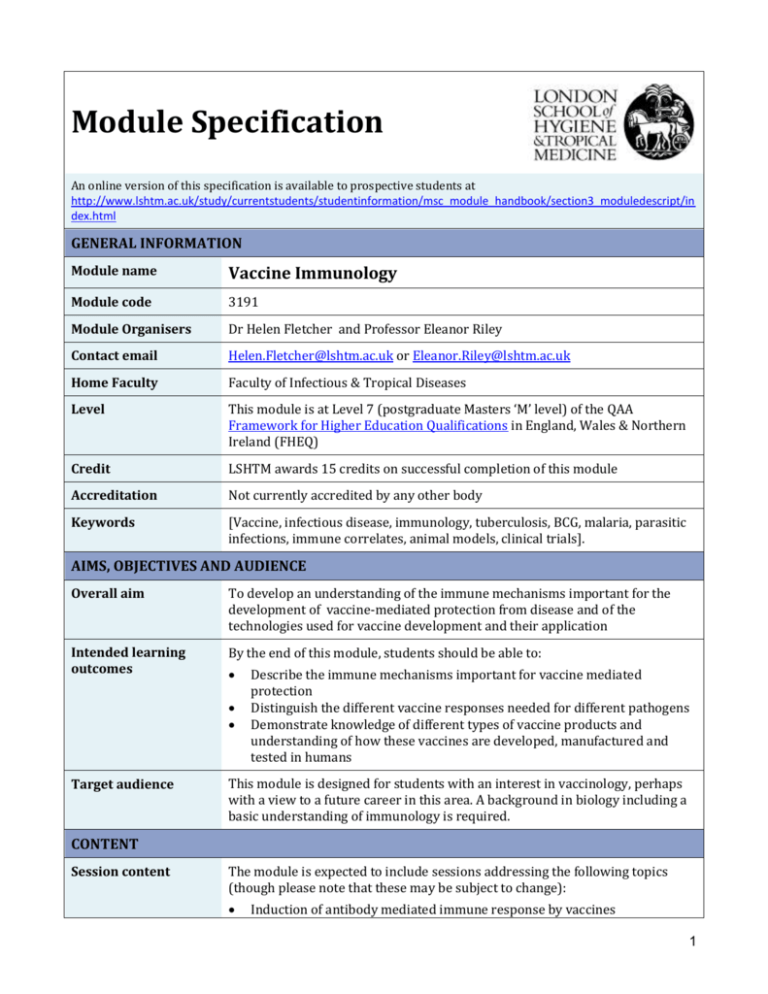
Module Specification An online version of this specification is available to prospective students at http://www.lshtm.ac.uk/study/currentstudents/studentinformation/msc_module_handbook/section3_moduledescript/in dex.html GENERAL INFORMATION Module name Vaccine Immunology Module code 3191 Module Organisers Dr Helen Fletcher and Professor Eleanor Riley Contact email Helen.Fletcher@lshtm.ac.uk or Eleanor.Riley@lshtm.ac.uk Home Faculty Faculty of Infectious & Tropical Diseases Level This module is at Level 7 (postgraduate Masters ‘M’ level) of the QAA Framework for Higher Education Qualifications in England, Wales & Northern Ireland (FHEQ) Credit LSHTM awards 15 credits on successful completion of this module Accreditation Not currently accredited by any other body Keywords [Vaccine, infectious disease, immunology, tuberculosis, BCG, malaria, parasitic infections, immune correlates, animal models, clinical trials]. AIMS, OBJECTIVES AND AUDIENCE Overall aim To develop an understanding of the immune mechanisms important for the development of vaccine-mediated protection from disease and of the technologies used for vaccine development and their application Intended learning outcomes By the end of this module, students should be able to: Target audience Describe the immune mechanisms important for vaccine mediated protection Distinguish the different vaccine responses needed for different pathogens Demonstrate knowledge of different types of vaccine products and understanding of how these vaccines are developed, manufactured and tested in humans This module is designed for students with an interest in vaccinology, perhaps with a view to a future career in this area. A background in biology including a basic understanding of immunology is required. CONTENT Session content The module is expected to include sessions addressing the following topics (though please note that these may be subject to change): Induction of antibody mediated immune response by vaccines 1 Induction of T cellular immune response by vaccines Innate immune responses and their importance in vaccine development Vaccines for tuberculosis Vaccines for malaria Vaccine for other parasitic infections Vaccine development and manufacture Clinical trials for testing candidate vaccines and monitoring licenced vaccines Immune correlates in vaccine development This module does NOT cover vaccine policy/vaccination programmes TEACHING, LEARNING AND ASSESSMENT Study resources provided or required Current research literature in major immunology journals/immunology text books Teaching and learning methods The teaching strategy will consist of formal lectures and student-centred learning through interactive small group work, oral presentations and discussion sessions. External speakers from industry and external vaccine development groups will be invited to contribute to teaching, and practical classes or visits may also be organised. Assessment details News and Views style report on recent publications in the vaccine field: 50% Exam: Problem solving/data analysis 50% For students who are required to re-sit, or granted a deferral or new attempt, the tasks will be alternative versions of the same assessments. Assessment dates Assessments will be due on the last day of the module, while the exam will take place during the last week of the module. For students who are required to re-sit, or granted a deferral or new attempt, the next assessment deadline will be the standard School-recommended date in mid/late September 2016. Language of study and assessment English (please see ‘English language requirements’ below regarding the standard required for entry). TIMING AND MODE OF STUDY Duration The module runs for 5 weeks at 2.5 days per week; this module runs between Wednesday lunchtime and Friday afternoon. Dates For 2015-16, the module will start on Wednesday 20 April 2016 and finish on Friday 20 May 2016. Timetable slot The module runs in LSHTM timetable slot E. Mode of Study The module is taught face-to-face in London. Both full-time and part-time students follow the same schedule. For full-time students, other LSHTM modules are available in the other half of the week for the C and D slots. Learning time The notional learning time for the module totals 150 hours, consisting of: Contact time ≈ 55 hours Directed self-study ≈ 25 hours Self-directed learning ≈ 10 hours 2 Assessment, review and revision ≈ 60 hours APPLICATION, ADMISSION AND FEES Pre-requisites This module is designed for students with a basic knowledge of immunology. English language requirements A strong command of the English language is necessary to benefit from studying the module. Applicants whose first language is not English or whose prior university studies have not been conducted wholly in English must fulfil LSHTM’s English language requirements, with an acceptable score in an approved test taken in the two years prior to entry. Applicants may be asked to take a test even if the standard conditions have been met. Student numbers As this is a taught course student numbers will only be limited by the size of the available teaching space Student selection Preference will be given to LSHTM MSc students and LSHTM research degree students. MSc IID students will have priority in case of the course being oversubscribed. Other applicants meeting the entry criteria will usually be offered a place in the order applications are received, until any cap on numbers is reached. Applicants may be placed on a waiting list and given priority the next time the module is run. Full Registration (full participation) by LSHTM research degree students is required for this module. Fees For registered LSHTM MSc students, fees for the module are included within MSc fees (given on individual course prospectus pages). If registering specifically for this module, as a stand-alone short course, individual module fees will apply. Tuition fees must be paid in full before commencing the module, or by any fee deadline set by the Registry. Scholarships Scholarships are not available for individual modules. Some potential sources of funding are detailed on the LSHTM website. Admission deadlines For 2015-16: For registered LSHTM MSc students, the module choice deadline (for Term 2 and 3 modules) is Friday 20 November 2016. If registering specifically for this module, applications may be made at any time but, as places are limited, applications ahead of the MSc deadline are strongly advised. All applications should be submitted at the latest 8 weeks prior to the start of the module. Formal registration will take place on the morning of the first day of the module. ABOUT THIS DOCUMENT This module specification applies for the academic year 2015-16 Last revised 25th Feb 2015 by Helen Fletcher and Eleanor Riley London School of Hygiene & Tropical Medicine, Keppel St., London WC1E 7HT. www.lshtm.ac.uk 3

